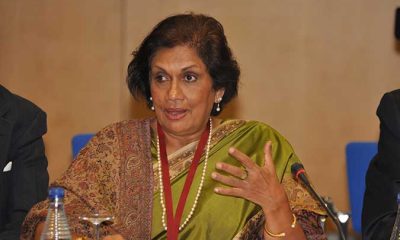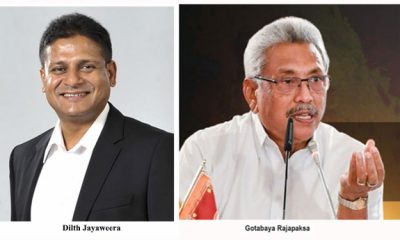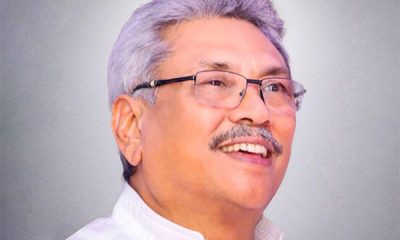Editorial
Gota’s return

There were reports on Friday morning as this is being written that former President Gotabaya Rajapaksa may be back in Sri Lanka over the weekend. No reasonable person will want to deny him his birthright of living here whatever the circumstances under which he ‘fled’ the country as has been stated ad infinitum since his departure. When he was forced to leave the country, caving into the massive ‘GotaGo’ demand, he did not find it easy to find a safe haven of refuge. It has been reported, though not confirmed, that he first explored the possibility of returning to the USA, whose citizenship he renounced, to run for president in Nov. 2019. Rajapaksa then as a dual citizen of Sri Lanka and the U.S. constrained by the then law from running for president while being a foreign citizen. Hence his renunciation of his U.S. citizenship.
When he was forced to depart, he first flew to the Maldives by military aircraft and within hours by a commercial flight to Singapore from where he resigned the presidency. The Singapore government which extended his original two week stay permit by two more weeks said on the public domain that GR was on a private visit and had not sought asylum. He had not been accorded facilities (perhaps other than security) or hospitality, an official statement from the Government of Singapore said. From the city state he flew to Thailand on a private charter and was confined to his hotel for reasons of security.
It has also been reported that he was exploring the possibility of returning to the United States where he had lived earlier following his premature retirement from the Sri Lanka Army holding the rank of lieutenant colonel. He returned to Sri Lanka following his brother’s election as president in 2005 and served as defence secretary until Mahinda Rajapaksa’s defeat in 2015, overseeing the end of the long war against the LTTE in 2009. He renounced his U.S. citizenship to run for president in 2019. Given his foreshortened tenure, he is reported to have explored the possibility of resuming U.S. residency. This, a former local employee of the U.S. Embassy in Colombo, now resident in the U.S. has said in a recent article, may not be easy for GR.
Although the former president renounced his U.S. citizenship, his wife retains her citizenship and his son and family live in that country. There may be reasons for allowing GR to return to the U.S. on grounds of family reunion. Also, as has been publicly pointed out, former presidents of Sri Lanka and their widows have several legal entitlements enjoyed by many of GR’s predecessors and their widows. He too would enjoy such entitlements. These include pensions, security, vehicles, residences and possibly staff. Mrs. Hema Premadasa, President Ranil Wickremesinghe noted in Parliament recently, is enjoying these benefits. So is former President Chandrika Kumaratunga who has accused President Mahinda Rajapaksa of attempting to, or actually doing her down. Former President Maithripala Sirisena, since his departure from office, continued to live in two government bungalows joined together as a presidential residence during his tenure but vacated those premises following a court order.
Although the actual date has not been set as this is being written, the former president is very likely be back in Sri Lanka in the short term. This has been discussed and facilitation requested by the SLPP. President Wickremesinghe, not long ago, expressed an opinion that the time was not right for Gota’s return. There is no doubt that the former president’s security, particularly, must be ensured. That is an obligation of the state. Like Presidents Jayewardene and Premadasa before him, GR chose to live in his private home at Mirihana rather than in President’s House for most of his tenure. Readers would remember that the Aragalaya gained momentum following an attack on this house, going beyond non-violent protest as was the case earlier. Although Rajapaksa as defence secretary lived in a government bungalow equipped with a giant tank in which sharks swam, he chose to continue living in his modest home as president. Once he is back, this may not be a suitable place for him to live on grounds of security considerations. His army pension too would be modest.
We do not know whether former Presidents Mahinda Rajapaksa and Maithripala Sirisena who continue in active politics as MPs, draw their presidential pensions in addition to their parliamentary emoluments. These, of course, would be entitlements. What we do know is there is massive adverse public opinion in the country about how our legislators look after themselves as incumbents and former incumbents. An MP, for example, is entitled to a life pension after a mere five years service in the legislature. Their widows/spouses continue to receive this benefit after their demise. Unlike the Widows and Orphans Pension in the public service, these benefits that parliamentarians enjoy are non-contributory. A magnificent gesture by two former Central Bank Governors, Mr. Sunil Mendis and Dr. Indrajit Coomaraswamy declining their pension entitlements was recently reported. But such gestures are all too rare in this country. In fact it was a self-serving maneuver in the Central Bank that created the entitlement that has been declined. It will be good to know whether former Governor Arjuna Mahendran, accused of culpability for the bond scams during the Yahapalanaya regime, is being paid a pension under the new rules despite his refusal to come back and face due process.
Editorial
Ensure safety of COPF Chairman

Saturday 8th June, 2024
It was with shock and dismay that we received the news about death threats to COPF (Committee on Public Finance) Chairman Dr. Harsha de Silva over the ongoing parliamentary probe into the on-arrival visa scam. Dr. de Silva yesterday told Speaker Mahinda Yapa Abeywardena, in Parliament, that he was facing death threats and intimidation, and it was incumbent upon Parliament to ensure his safety. He stopped short of naming names, but revealed that some ruling party MPs were among those who had ganged up against him. The Speaker only said there had been no complaint, and he would look into the matter.
The SLPP-UNP government has been doing everything in its power to have all parliamentary committees under its thumb. The COPE (Committee on Public Enterprises), which once helped restore public faith in the legislature by exposing state sector corruption, has now become a mere appendage of the incumbent regime, thanks to the appointment of SLPP MP Rohitha Abeygunawardena as its Chairman. The SLPP-UNP combine also tried to oust COPF Chairman Dr. de Silva, but in vain. However, it knows more than one way to shoe a horse.
The COPF, under Dr. de Silva’s chairmanship, has been a thorn in the side of the government, which is struggling to cover up numerous corrupt deals. Dr. de Silva yesterday told Parliament that he found it extremely difficult to function as the COPF head due to severe resource constraints his committee was facing; he himself had to pay the salaries of some of his staff members besides burning the midnight oil.
The sheer workload he had to cope with as the COPF chief had taken its toll on his health, he said, informing the Speaker that he was at the end of his tether, and at times thought of resigning from the COPF. This is exactly what the government wants him to do; resource squeezes and threats are aimed at making him quit.
On 26 May, Dr. de Silva revealed, in an ‘X’ post, that the COPF had uncovered some vital information about the visa scam and it would reveal everything after its final meeting on the issue; the COPF was committed to exposing the truth behind the controversial tender, he added. In an editorial comment on 27 May, we warned him.
While thanking him for his bold stand, we pointed out that by making such a statement, he had thrown caution to the wind, and become a marked target, with the government making an all-out effort to delay the COPF investigation lest the truth should come out much to the detriment of its interests in this election year. Unfortunately, what was feared has come about; Dr. de Silva is complaining of death threats and government moves to strangulate the COPF financially to derail its investigations.
Dr. de Silva’s predicament exemplifies the fate that befalls the few good men and women in Parliament. It is hoped that all those who seek an end to the state sector corruption will rally behind Dr. de Silva, and bring pressure to bear on the government to ensure his safety. Let Dr. de Silva be urged to reveal the names of those who have issued threats, veiled or otherwise, to him and are trying to scuttle the COPF probes.
Editorial
Dead man walking!

Friday 7th June, 2024
The SLPP-UNP government is going hell for leather to make bad laws as if there were no tomorrow. It is abusing its parliamentary majority, which has been retained with the help of some crossovers, for that purpose. The Opposition, the media and trade unions are up in arms, and understandably so. The incumbent regime is a dead man walking; it is so desperate that it is capable of anything. Hence the need for it to be restrained.
The Electricity (Amendment) Bill (EAB) plunged Parliament into turmoil yesterday, but the government secured its passage. The Supreme Court (SC) determined the entire EAB inconsistent with the Constitution and recommended changes thereto. After unveiling the Bill, sometime ago, Minister of Power and Energy Kanchana Wijesekera hailed it as an excellent piece of legislation aimed at straightening up the power sector to serve the public interest better.
The SC determination left him with egg on his face. He reminded us of the proverbial curate who, while eating a stale egg, assured his host, a Bishop, that parts of it were excellent. Wijesekera’s egg, as it were, made Parliament stink yesterday, but he sought to please his masters by praising it as a silver bullet.
EAB should have been discarded and a new one drafted in consultation with all stakeholders. But the government is apparently driven by an ulterior motive; its aim is not to serve Sri Lanka’s interests but to look after those of some moneybags.
It is not uncommon for Bills to contain some flaws, which are rectified either before or during the committee stage. But there is something terribly wrong with draft Bills that are full of sections inconsistent with the Constitution. The drafters of EAB have demonstrated their sheer ignorance of the supreme law, and that they are not equal to the task of drafting Bills. If they had read the Constitution at least perfunctorily, they would not have drafted such a bad law.
Ignorant and incompetent, they do not deserve to be paid with public funds and must be sent back to law school. They must be summoned before Parliament and questioned on their serious lapses, which have caused public faith in the national legislature to diminish.
Curiously, the MPs who demand that judges, doctors, Central Bankers, and other public officials be summoned before Parliament have taken badly drafted Bills for granted. The power sector trade unions yesterday alleged that EAB was of Indian origin and geared towards furthering the interests of Adani Group at the expense of Sri Lanka.
Most critics of EAB are agreeable in principle to the need for power sector reforms; the Ceylon Electricity Board should be given a radical shake-up, and transformed into a modern organisation capable of providing a better service at a lower cost. They only asked the government to tread cautiously, consulting all stakeholders and taking action to ensure that the country’s interests prevailed over everything else. But the government was in a mighty hurry to steamroller the Bill through Parliament, making the Opposition ask whether it was doing so at the behest of some external forces involved in controversial power generation deals here.
What is passed by the current Parliament can be either amended or abolished by a future parliament in a constitutionally prescribed manner. But that does not mean that a government is free to pass bad laws, making the country enter into long-term agreements with powerful nations and their investors. It looks as if the SLPP-UNP regime did not care two hoots about the consequences of its actions.
Editorial
Modi Magic on the wane

Thursday 6th June, 2024
The outcome of India’s parliamentary election (2024) has led to a ‘perspective ambiguity’. Prime Minister Narendra Modi lost no time in declaring victory for the BJP-led NDA alliance, which secured 293 seats in the 543-member Parliament, but he must be a worried man. The BJP is short of 32 seats to form a government under its own steam; it has lost 63 seats or about 20% of its parliamentary strength. It had 303 seats in the previous Parliament, and that number has dropped to 240.
Modi has become the second Indian Prime Minister to win a third term. The first PM to do so was Jawaharlal Nehru. But Nehru won an outright majority in Parliament in 1962; Modi has had to depend on smaller parties in his alliance to retain his hold on power. Modi must be reeling from a sharp drop in his victory margin in his own constituency, Varanasi; it has decreased to 152,000 from 480,000 in 2019 whereas Modi’s bete noire, Rahul Gandhi, won Raebareli by a staggering 390,000 votes.
Modi, who reigned supreme with 303 seats in the previous Parliament, is now dependent on parties such as Nitish Kumar’s JD-U and Chandrababu Naidu’s TDP to form a government. He has had to lead an alliance of strange bedfellows. Both Kumar and Naidu were bitter critics of Modi. Kumar helped form the oppositional alliance, the INDIA bloc, before switching his allegiance to PM Modi. Naidu also closed ranks with the BJP in the run-up to the election. These politicians have been described as extremely ambitious and highly unpredictable, and whether Modi will be able to manage them and consolidate his grip on the NDA alliance remains to be seen. They will demand plum ministerial posts in return for their support. The TDP is said to be eyeing Transport and Health portfolios! That is the name of the game in coalition politics, where it is not uncommon for the tail to wag the dog, so to speak. These two political leaders are however not the only problem Modi will have to contend with. The next five years will feel like an eternity for PM Modi.
Nothing would have been more shocking for the BJP than its defeat in Uttar Pradesh’s Faizabad constituency, where the Ram Mandir has been built. Modi may have thought he would be able to win the Lok Sabha election hands down after the consecration of that temple, which became a centrepiece of the BJP’s election campaign. The BJP lost that seat to the Samajwadi Party! Modi must be disappointed that the Ram Mandir hype failed to trigger a massive wave of support for his party. This particular defeat signifies a massive setback for the BJP’s ethno-religious agenda.
Modi’s divisive election campaign failed to yield the desired result. The BJP’s failure to secure an outright majority could be attributed to a host of factors, some of them being the suppression of the Opposition, the arrogance of power, chronic unemployment, and the rising cost of living. The BJP also did not care to reimage itself in a positive light to attract the youth.
Modi will hereafter see the Congress-led INDIA bloc with 223 seats, in his rearview mirror. The Congress (99 seats) and its allies have eaten into the BJP support base considerably, but they have a long way to go before being able to capture power.
The bumpy ride ahead for the BJP-led coalition government to be formed may improve the INDIA bloc’s chances of bettering their electoral performance and turning the tables on the BJP and its allies in time to come. Modi will have a lot to worry about in his third term.
























